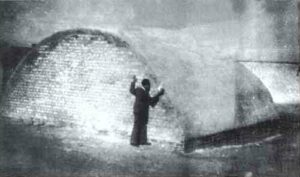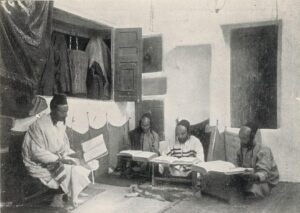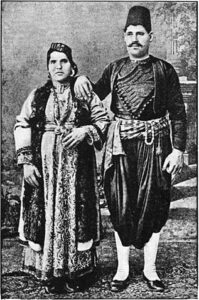Sarah Levin is Executive Director of JIMENA, Jews Indigenous to the Middle East and North Africa. At JIMENA, Levin researches and develops projects that preserve the heritage, identities and experiences of Mizrahi and Sephardic Jews.
Currently, the U.S. has cultural property agreements with the following MENA nations: Syria, Libya, Iraq, Egypt, Jordan, and Algeria. Additional requests for agreements from Yemen and Morocco were made in 2019 which are still pending. A hearing on requests for import restrictions for cultural objects from Turkey and Tunisia will be held at the State Department on January 21, 2020. Public comments must be submitted by January 7, 2020 and requests to speak by January 14, 2020. Info on participation: Cultural Property Advisory Committee Meeting January 21, 2020.
CPN’s Kate Fitz Gibbon spoke with Levin at a December 12, 2019 program for the Art & Cultural Heritage Law Committee of the ABA.
KFG: Let’s get started with what you do at JIMENA.
Sarah Levin: Before I talk about JIMENA itself, it’s important to back up and give some historical context about the community that we represent. The story of Jewish refugees and the advocacy work that we do is not only a Jewish story. It is a story of most of the religious minorities in the region. It is continuing today with the ethnic cleansing of the Yazidi and the oppression of Christians in the region. When we are working on our campaigns we are obviously first and foremost working on behalf of the former Jewish refugees, but we’re also trying to raise awareness about what is happening with other religious minority communities. This is not just our oppression; it is sadly the oppression and the story of multiple religious minorities in the region.

Shofar for the Sabbath: Yemenite Jew, 1934-1939, Matson Collection, Library of Congress Prints and Photographs Division Washington, D.C.
Between the 1940s and today, close to one million Jews who had lived in the MENA region continuously for over 2,000 years were either ethnically cleansed or fled under duress from state sanctioned anti-Semitic persecution. When these communities that were spread all the way from Morocco to Yemen to Iran had to flee, their properties were seized and confiscated, often under the cover of law. It’s important to keep in mind that these were urban communities, towns and cities in which entire Jewish communities disappeared.
Educating the wider Jewish community and larger institutions about this history is about integrating our stories and our heritage into their work. For us to be effective advocates, education and advocacy are symbiotic. So in the realm of advocacy, we have worked hard to pursue policies to protect the heritage and rights of former Jewish refugees. Our speakers have provided testimony to various government bodies. We have led a number of campaigns that have focused on anti-Semitism but are also connected to the story of Jewish refugees. We have been quite active working on these cultural property campaigns – they are one piece in a longer chain of advocacy initiatives that we’ve been involved in for a long time.
KFG: So it’s a developing process?
Sarah Levin: The more influential Jewish institutions don’t have the knowledge and the background on the issues facing Jews of Middle Eastern heritage. Our goal is to help educate them so they can advocate for all. Organizations like Conference of Presidents or B’nai B’rith International have a far greater reach than we do. We need to continuously support their work and in turn educate them about ours in order for us to achieve these common goals.
KFG: Have larger Jewish organizations primarily focused on European Jewish issues?
Sarah Levin: I would assume so. The larger Jewish organizations are often dealing with contemporary political issues. Mizrahi and Sephardic Jews are a minority in the United States, and we haven’t been a very vocal minority until the last ten years or so.
KFG: How did JIMENA become involved in cultural property legal issues?

Judaism in Iraq, Mass grave of victims of the Farhud, 1941. From the book ‘Iraq’ (edited by Haim Saadoun), published by the Ministry of Education and the Ben – Zvi, Jerusalem, (5762, 2002) page 17.
Sarah Levin: It began with the discovery of the Iraqi Jewish archives. In 2003, U.S. forces brought a trove of ten thousand items, we think it’s about ten thousand items, back to the U.S. We don’t really know how many items there are because we don’t have a copy of exactly what made up this archive. These Iraqi Jewish materials were found in Saddam Hussein’s secret police headquarters in 2003. Many were seized from synagogues where Iraqi Jews stored personal items for safety. The Iraqi Jewish archive was brought to the U.S. with the stipulation that it would be restored and ultimately returned to Iraq. There were actually two archives within this trove of materials: one was documents dealing with the Ba’athist regime and the other was documents exclusively from the Jewish community. The Jewish archive contained manuscripts, private property like personal and family records and communal property such as religious scrolls. It contained patrimony that is considered sacred by Iraqi Jews and Jewish people in general.
When the archive was first brought here in 2003, JIMENA was not involved in the restoration and documentation work. Then, in 2010 we started working very closely with former Federal Judge Abraham Sofaer and attorney Carole Basri on keeping the Iraqi Jewish archives here rather than sending them back to Iraq.
JIMENA has a lot of Iraqi Jewish members. We saw that this was an issue that wasn’t gaining enough attention in the Jewish community, but was a big deal for us. It was a big deal that our government was not understanding that Jewish people are the rightful owners of our cultural property. That was our introduction to these larger cultural property problems, and challenges, and laws.
KFG: Rightful ownership is a key issue in agreements under the Cultural Property Implementation Act that JIMENA has objected to. Can you talk about your work with the State Department on those issues?

Maghrebi Sephardi Jews. circa 1919. Author Unknown. Wikimedia Commons.
Sarah: I would like to say that we work with the State Department – but we actually aren’t able to work with them at all. We are coming from a different position and bringing up rights of Jewish owners that challenge State Department policy in a lot of ways, particularly at the Cultural Property Advisory Committee that has been recommending agreements with North African and Middle Eastern countries that ethnically cleansed their Jewish populations and confiscated our property in the process. We didn’t know that these agreements were being signed until you brought it to our attention. I believe it was 2016 when the Libyan MOU was considered. We had no idea that these agreements were being signed because the public isn’t really told what’s going on. It was happening behind closed doors.
For the last three MOU hearings and a pending request by the government of Turkey, where Jews are experiencing real problems now, and which will be happening early in January, the call for public comment has happened during major Jewish holidays, which has made the organization of response from the Jewish community a challenge. [Ed. The cultural agreements are Memoranda of Understanding (MOU) between the US and foreign governments.]

Zaoud el Mara, Jewish Quarter, Alexandria Egypt.
We’ve done our best to raise concerns within the Department of State. We have mobilized support within large Jewish institutions. We’ve done our best to pressure legislators to create some accountability. We sent communal letters to Secretary of State Kerry and then Secretary of State Pompeo about the Iraqi Jewish Archive, but the response has been nil. There is not a person at the State Department willing to work with us so we feel that we have been ignored. We’ve certainly been ignored at public hearings. It seems to me that it’s sort of a sham show. The Cultural Property Advisory Committee treats these requests as if they have no alternative to all-encompassing agreements. That’s not what the law says. These agreements are done in a way that is almost malicious. Our government is not considering the rights of Americans when they are signing these agreements.
KFG: The State Department has said that some agreements don’t specifically include objects of Jewish heritage but then the Designated Lists of objects that can’t enter the U.S. include Jewish materials because they are indistinguishable from other urban products and the foreign governments claim all cultural property. Some of the Designated Lists that were created before JIMENA got involved specifically include Torahs and Hebrew manuscripts. The State Department also works with ICOM, the International Council of Museums on the Red List. Would you like to address any of that?

Yemeni Jews in a synagogue in Sana’a, Yemen, 1907, Hermann Burchardt, Wikimedia Commons.
Sarah Levin: These Red Lists are like precursors for the MOUs and the creation of the Designated Lists. The Red List seems to be compiled by the national governments in partnership with the State Department. The recent Red List for Yemen specifically mentioned Torah scrolls, so it is absolutely clear that Yemen’s government wants to be recognized as the owners of Torah scrolls.
These governments have never protected Jewish people; they did nothing to protect our rights. When Jews fled they were not able to take any of their cultural property with them. For example, Jewish cultural property included silver work. Jewish people were the primary silver workers in Yemen. Their silver work and filigree is recognized as beautiful folk art that had incredible value for Yemen, but they were not allowed to leave with it. Muslims and other communities did not practice silver work. We had this part of our cultural heritage taken from us, our Torah scrolls were taken from us, and now we have a situation where the Yemeni government is in partnership with the State Department, seeking permission to take ownership over properties that they confiscated, without recognizing or hearing the concerns of Jewish people.
KFG: Can you talk about any collaboration with the wider Jewish community?

Turkish Jews. Late-Ottoman era, late 19th century, Public domain, Wikimedia Commons.
Sarah Levin: JIMENA does not do this work alone. We don’t have the capacity to do it nor do we have the staffing and the knowledge. We work with volunteer lawyers and political strategists and advocates. We work with other Jewish organizations. The Conference of Presidents, a major Jewish organization, has recently been very vocal on this issue. B’nai B’rith International has been working on this issue for a very long time. Help from their director of legislative affairs has been critical. In some of the communal letters, when we’re trying to mobilize support, the Anti-Defamation League has been involved, the Simon Wiesenthal Center has been involved, and many other smaller Jewish organizations.
KFG: What makes this important for you personally?
Sarah Levin: My perspective is that this is an issue of justice. Jews from the Middle East and North Africa have been deprived of their property. That is an actual violation of article 17 of the Universal Declaration of Human Rights, which says that no community or individual should be arbitrarily deprived of their property. Jews from the Middle East and North Africa were forced to leave everything behind. Everything. They have been deprived of access to their property and ownership of their property, and even accessibility to their property. To me, this is not just a Sephardic, Mizrahi or Middle Eastern Jewish issue; it is a Jewish issue in general.
This is a human rights question. My greatest hope is that the Middle East will move forward toward being a better place that recognizes the rights of religious minorities. This issue could be one potential way that we could move forward.
I don’t think that there is any hope among former Jewish refugees that they will be able to retrieve the millions of dollars of property that were confiscated from them, but Torah scrolls, and sacred cultural patrimony manuscripts, these belong to the Jewish people. These are holy items. Questions of ownership should not exist. It is incredible to me that our government is even questioning who are the rightful owners of Torah scrolls.

Yemenite Jew in striped robe. Stereograph. Circa 1900 until 1920. Library of Congress, via Wikimedia Commons.
On a deeper level for me personally, I’m half Sephardic and half Ashkenazi and my grandfather was a Holocaust survivor. He absolutely refused any kind of assistance. He didn’t want to take any money from the German government. He wasn’t interested in this at all. But I compare the MENA situation to the huge organized effort to restitute art and property back to Holocaust survivors and their families. The German government gives the Israeli government so much money as a form of reparation. We know that’s out of the question for us. We can’t even think about that. This double standard does hurt. It almost seems like Mizrahi and Sephardic Jews don’t matter. And that is wrong to me, just wrong.
KFG: Some archeological advocacy groups have noted that Jewish manuscripts and Torahs have been offered for sale on the internet from Middle Eastern and North African countries. If these are imported into the U.S. and then seized, what do you think U.S. Customs should do with them?
Sarah: There are well-organized Jewish communities from each country in the Middle East and North Africa here in the United States. The question of ownership shouldn’t even be a question. Those items should be returned to communities in diaspora. There are Yemenites in diaspora. There are Libyan and North African synagogues. There are Iraqi synagogues. We have the infrastructure to be able to have these items returned to us. So it shouldn’t even be a question. These are not part of the identity of the anti-Semitic governments that forced one million Jews to flee and confiscated their property. This question of ownership needs to be clarified by our government once and for all.
KFG: What about access to synagogues and cemeteries in Arab nations? Can you speak about why it is important to have that access? The Cultural Property Implementation Act does require that a county granted an MOU take actions to preserve and protect cultural heritage within its own country.

Great Synagogue of Oran, now a mosque. Oran, Algeria.
Sarah Levin: The cultural heritage of Jews in those countries has been destroyed or desecrated. There are instances where Jewish sites have been protected by Christians who remain, but in general Jews cannot return to these countries. Jewish communities from Yemen cannot go back to Yemen. Jewish communities from Libya cannot go back to Libya. There are a lot of examples of people trying to return to some of these countries and being thrown into prison.
With the Iraqi Jewish archives in particular, because there has been an exhibit here, and some of the materials have been digitized, one of the things we’ve heard from the U.S. government is that access to the materials is no longer a problem.
To us that’s just ridiculous. Ownership is the ongoing question. Accessibility on a computer is not the same as being able to take ownership over your cultural property. Accessibility is not an option. We can’t go back to most of these places in the Middle East. In some countries it is just not safe for Jews to return to our cemeteries. Cemeteries have been destroyed and synagogues and holy pilgrimage sites have been turned into mosques. Accessibility is kind of a ridiculous point in my opinion.
KFG: Can you describe what the Conference of Presidents is and what their statement said about these issues?
Sarah Levin: The Conference of Presidents is a major Jewish organization. It is a bipartisan coalition of the majority of large Jewish organizations in the United States. They are a voice for the whole Jewish community. They recently issued a statement denouncing these MOUs and what’s been happening with these cultural property agreements which are denying Jews access and ownership to our confiscated property.
KFG: How do people reach JIMENA and access your website?
Sarah Levin: Our website is www.jimena.org. We are always looking for and welcome partnerships with attorneys and experts on these issues. I am glad to hear your thoughts and get you involved. We are also asking people to sign a petition to bring additional attention to these issues. We need all the help and support we can get.
KFG: Thank you, Sarah , for bringing this important issue to our attention.
Additional sources:
Statement from the Conference of Presidents of Major American Jewish Organizations and Letter to Secretary of State Pompeo from 18 Jewish organizations on U.S. cultural property agreements with Middle Eastern and North African countries:
November 27, 2019 Conference of Presidents Calls on the State Department and Congress to Protect Jewish Heritage in Arab Countries
Nov 27th, 2019
New York, NY
. . . Arthur Stark, Chairman, and Malcolm Hoenlein, Executive Vice Chairman/CEO of the Conference of Presidents of Major American Jewish Organizations, issued the following statement:
“We are deeply disturbed by the efforts of several Arab countries to declare that the historical archives, religious items, and communal property of the Jewish communities that lived in these countries should be retained as a part of these countries’ cultural heritage, rather than restored to the communities of those forced to leave. In what has been proven to be a coordinated governmental campaign of discrimination and expulsion across the Arab world following the establishment of the State of Israel in 1948, most Jews left with the clothes on their backs and little more. The value of the personal and communal property left behind and the religious and cultural items accumulated over hundreds of years, is immeasurable.
The United States is involved in negotiations at this time with several of these countries regarding the Memorandums of Understanding concerning their national cultural antiquities. We call upon Congress and the Administration to work together to ensure that the surviving Jewish communities of those that lived in Arab countries be granted their rights to cultural and religious artifacts, in accordance with accepted international law, including the Hague Convention of 1954. To do otherwise would compound the crimes committed against these communities. Synagogues and other communal institutions should be refurbished and protected by the countries in which they are located.
We understand the intent to prevent the theft and smuggling of antiques, but no measure should be adopted without consultation and input from those who have the most rightful claim. As there are virtually no Jews left in these countries, the expatriate communities around the world must be able to have a significant role in determining the access, availability, and ultimate location of these items, which represent their age old heritage.”
December 9, 2018 Letter to Secretary Pompeo from JIMENA and 18 other Jewish Organizations:
“JIMENA
Jews Indigenous to the Middle East and North Africa
December 9, 2018
The Honorable Michael Pompeo
Secretary of State
Dear Secretary Pompeo,
On behalf of the undersigned Jewish organizations we are writing to encourage the State Department and the Bureau of Educational and Cultural Affairs to explicitly recognize the rights of Jewish and minority heritage when negotiating future cultural property agreements with countries in North Africa and the Middle East. During the 20th century, 850,000 indigenous Jews from the region were ethnically-cleansed or forced to flee lands their ancestors lived in for over two-thousand years. Virtually all of their personal and communal property was confiscated. The dispossession and denationalization of nearly one million Jewish refugees was done under the color of law and today there are very few Jews remaining in most of these countries.
The State Department has signed Memoranda of Understanding (MOUs) between the United States and other governments that deny Christians and Jews from Arab countries the right to their historic heritage. The Cultural Property Implementation Act (CPIA) was enacted to deter the looting of archeological sites by enacting temporary import restrictions on significant cultural items as part of a multilateral effort. Unfortunately, over time these restrictions have expanded beyond both the law’s intent and its legal authority.
We recognize the importance of these MOU agreements in deterring the pillaging of archaeological and ethnological materials. However, an additional goal of these agreements, as noted in the Convention on Cultural Property Implementation Act, is to, “increase international access to cultural property.” This has a particular relevance with regard to Jewish heritage, which encompasses both moveable (e.g., Torah scrolls, ritual objects, libraries, communal registers) assets and immovable (e.g., synagogues, cemeteries, religious shrines) assets. Regrettably, it is not safe – and in many cases forbidden by national law – for Jewish refugees from Arab countries to return to the countries that exiled them.
On July 31st, 2018, during a public hearing at the Department of State on the Request of the Government of the People’s Republic of Algeria for U.S. import restrictions on virtually the entire cultural heritage of Algeria, representatives of exiled Middle Eastern Jews urged the Cultural Property Advisory Committee to the President to withhold these import restrictions. Algeria has failed to meet the criteria set for restrictions under the Cultural Property Implementation Act. It would be unconscionable for the United States to give the Algerian government authority and control over the property of its oppressed and exiled Jewish and Christian citizens.
As MOU agreements demand that the governments themselves show they are taking measures to preserve and protect the heritage in their own countries, North African and Middle Eastern countries, including Algeria, requesting MOUs should be asked to present an inventory of remaining Jewish moveable and non-movable patrimony and an account of what they are actively doing with respect to the care of synagogues, cemeteries and other sites and items of Jewish and Christian heritage.
The recent statement by the Principal Deputy Assistant Secretary for Near East Affairs, Joan Polashick, that the State Department is working on an additional five MOUs with Middle Eastern and North African nations makes it essential that a policy is in place that protects Jewish and Christian heritage by explicitly excluding them from any import restrictions and rejecting any state claims to individual and communal property.
We ask that the State Department’s Bureau of Education and Cultural Heritage adheres to the limitations set by Congress under the Cultural Property Implementation Act by denying broad, excessive import restrictions to nations that have neither valued nor cherished the ancient heritage of Jewish, Christian, and other minority peoples. We further request that all future MOUs from the region include provisions that list and name specific Jewish and Christian items to be excluded from the restricted list of items. Such items include: Torah scrolls, Torah cases, Jewish prayer books, Jewish manuscripts, religious ceremonial articles, and all Jewish ritual and prayer materials that include Hebrew inscriptions or references to original Jewish owners – whether they be individuals or Jewish institutions.
It is more important than ever for the United States to stand in solidarity and defense of Christian, Jewish and other religious minorities in the Middle East and North Africa, to ensure that these living communities are not deprived of their rich cultural heritage. Thank you for your attention. We look forward to remaining in communication with the State Department on this crucial issue.
Thank you,
Gina Waldman Sarah Levin
President, JIMENA Executive Director, JIMENA
Organizations:
- A.A. Society
- The American Sephardi Federation
- ADL: The Anti-Defamation League
- B’nai B’rith International
- Centre for Israel and Jewish Affairs (CIJA)
- Conference of Presidents of Major American Jewish Organizations
- Harif: UK Association of Jews from the Middle East and North Africa
- Historical Society of Jews from Egypt
- Iranian American Jewish Federation (IAJF)
- JIMENA: Jews Indigenous to the Middle East and North Africa
- JJAC: Justice for Jews from Arab Countries
- The Lawfare Project
- Morial: French Association of Algerian Jews
- Sephardic Educational Center
- Sephardic Legacy Project
- Simon Wiesenthal Center
- World Jewish Congress North America
- Yemenite Jewish Federation of America”
 Airlift, rescuing the Jews of Yemen, 1949, The Israel Internet Association via the PikiWiki - Israel free image collection project.
Airlift, rescuing the Jews of Yemen, 1949, The Israel Internet Association via the PikiWiki - Israel free image collection project. 

